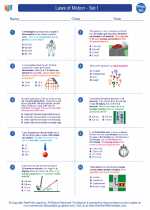Embryonic Development
Embryonic development is the process by which a single-celled zygote undergoes a series of complex and coordinated changes to develop into a multicellular organism. This process involves cell division, differentiation, and morphogenesis, and is tightly regulated by genetic, molecular, and environmental factors.
Stages of Embryonic Development
Embryonic development can be broadly divided into the following stages:
- Fertilization: The fusion of a sperm cell with an egg cell to form a zygote.
- Cleavage: The rapid division of the zygote into a ball of cells called a morula, and then into a hollow structure called a blastula.
- Gastrulation: The rearrangement of the cells in the blastula to form the three primary germ layers - ectoderm, mesoderm, and endoderm.
- Organogenesis: The process by which the germ layers develop into the organs and organ systems of the embryo.
- Fetal Development: The final stage of prenatal development, during which the embryo grows and matures into a fetus.
Factors Influencing Embryonic Development
Embryonic development is influenced by a variety of factors, including:
- Genetic Factors: The genetic information inherited from the parents determines the basic developmental plan of the embryo.
- Environmental Factors: External factors such as nutrients, temperature, and pH can profoundly influence embryonic development.
- Cell Signaling: Communication between cells, often through signaling molecules, plays a crucial role in coordinating the complex processes of embryonic development.
- Epigenetic Regulation: Chemical modifications to DNA and histone proteins can regulate gene expression during embryonic development.
Study Guide
Here are some key concepts and questions to focus on when studying embryonic development:
- Describe the process of fertilization and the events that occur during cleavage.
- Explain the significance of gastrulation in establishing the basic body plan of the embryo.
- Illustrate the role of cell signaling in coordinating embryonic development.
- Discuss the impact of genetic and environmental factors on embryonic development.
- Compare and contrast the development of different germ layers and their contributions to organogenesis.
- Investigate the ethical and legal implications of embryonic development, particularly in the context of reproductive technologies and stem cell research.
By understanding the intricacies of embryonic development, we gain valuable insights into the fundamental processes that shape life itself.
.◂Physics Worksheets and Study Guides High School. Laws of Motion - Set I
Worksheet/Answer key Laws of Motion - Set I
Laws of Motion - Set I  Worksheet/Answer key
Worksheet/Answer key Laws of Motion - Set I
Laws of Motion - Set I  Worksheet/Answer key
Worksheet/Answer key Laws of Motion - Set I
Laws of Motion - Set I  Worksheet/Answer key
Worksheet/Answer key Laws of Motion - Set I
Laws of Motion - Set I 

 Worksheet/Answer key
Worksheet/Answer key
 Worksheet/Answer key
Worksheet/Answer key
 Worksheet/Answer key
Worksheet/Answer key

The resources above cover the following skills:
PHYSICAL SCIENCE (NGSS)
Energy
Students who demonstrate understanding can:
Develop and use models to illustrate that energy at the macroscopic scale can be accounted for as either motions of particles or energy stored in fields.